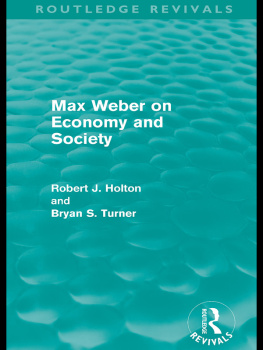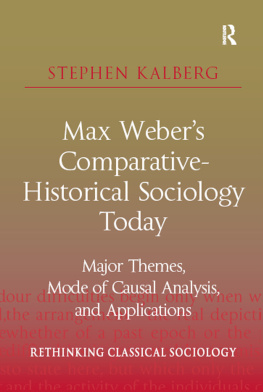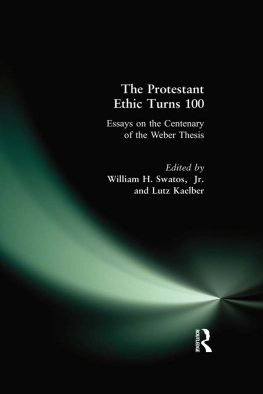First published in 1984
Reprinted in 2006 by
Routledge
2 Park Square, Milton Park, Abingdon, Oxon, OX14 4RN
Transferred to Digital Printing 2007
Routledge is an imprint of Taylor & Francis Group, an informa business
1984 Stanislav Andreski
All rights reserved. No part of this book may be reprinted or reproduced or utilized in any form or by any electronic, mechanical, or other means, now known or hereafter invented, including photocopying and recording, or in any information storage or retrieval system, without permission in writing from the publishers.
The publishers have made every effort to contact authors and copyright holders of the works reprinted in the Weber series. This has not been possible in every case, however, and we would welcome correspondence from those individuals or organisations we have been unable to trace.
These reprints are taken from original copies of each book. In many cases the condition of these originals is not perfect. The publisher has gone to great lengths to ensure the quality of these reprints, but wishes to point out that certain characteristics of the original copies will, of necessity, be apparent in reprints thereof.
British Library Cataloguing in Publication Data
A CIP catalogue record for this book
is available from the British Library
Max Webers Insights and Errors
ISBN10: 0-415-40216-6 (volume)
ISBN10: 0-415-40210-7 (set)
ISBN13: 978-0-415-40216-3 (volume)
ISBN13: 978-0-415-40210-1 (set)
Routledge Library Editions: Weber
Max Weber's insights and errors
Stanislav Andreski
Professor of Sociology, University of Reading
First published in 1984
by Routledge
2 Park Square, Milton Park, Abingdon, Oxon, OX14 4RN
270 Madison Ave, New York NY 10016
Set in 10/llpt Times
by Columns of Reading
Stanislav Andreski 1984
No part of this book may be reproduced in any form without permission from the publisher, except for the quotation of brief passages in criticism
Library of Congress Cataloging in Publication Data
Andreski, Stanislav.
Max Weber's insights and errors.
(International library of sociology)
Includes index.
I. Weber, Max, 1864-1920. 2. Sociology. I. Title.
II. Series.
HM22.G3W3975 1984 301'.092'4 83-26974
British Library CIP data available
ISBN 0-7102-0051-X
When nearly four decades ago I took an optional paper in Theories and Methods of Sociology, as a part of a degree in economics in the University of London, Max Weber was not included in the syllabus, Morris Ginsberg (then the sole professor of sociology in Britain) did not say much about him. Our main textbook Sorokin's Contemporary Sociological Theories (still well worth reading for other reasons) discussed Weber briefly on a par with dozens, if not hundreds, of other writers. At that time only two pieces of Weber's writings were available in English: The Protestant Ethic and the Spirit of Capitalism and General Economic History. As the latter was on the reading list of the course in Economic History 1760-1914, I read it and was entranced with the last three chapters. They seemed to me to explain what the other books on the reading list merely described. When I asked Ginsberg about Weber he said he was well worth reading but he gave me the impression that he was not as good as L.T. Hobhouse Ginsberg's teacher and predecessor who certainly was a scholar of high quality and is still well worth reading, but no great innovator. However, after Karl Mannheim (who as an exile had to be contented with a lectureship) told me that Weber was the greatest writer on sociology, and that one cannot become a competent sociologist without reading his main works, I decided to brush up my German specifically for this purpose. I had more opportunities to do so later, during my service with the occupation forces in Germany: I managed to obtain, after a long search, all the books in exchange for food or cigarettes. When I found Wirtschaft und Gesellschaft I could hardly sleep with excitement. It was the first book in German which I had read from cover to cover, and (while waiting for demobilisation) I spent eight months doing nothing else but deciphering it laboriously with the aid of a dictionary. By the time I got to the end, I could read anything in German with ease.
I became an admirer of Weber (and of a number of other German writers of his era) when I still had fresh in the mind various memories which could well have prejudiced me against everything made in Germany, especially by outspoken nationalists. None the less, in my first book I called him 'the greatest thinker to whom the name of sociologist can be applied'. I have even made a very illustrious convert to the circle of British admirers of Weber, which at that time was exceedingly small: namely, the co-founder of the functionalist school of anthropology Radcliffe-Brown. After retiring from his chair at Oxford he came as a visiting professor to Rhodes University College, South Africa, where I was a junior lecturer; and, despite the difference of age, I became his closest friend there. In our many chats I often spoke about Weber and lent him my copy of Wirtschaft und Gesellschaft. Having read some of it, he said to me: 'it is really damned good stuff.... What a pity nobody told me about him earlier.'
I mention these autobiographical details to make clear that it is not my purpose to debunk Weber. Whenever I re-read him it gives me great pleasure to savour the fertility and range of his intellect. None the less, you cannot build anything deserving the name of science (even in the loosest sense of this word) on ancestor worship. Weber himself said: 'we work in order to be overtaken'. It is one of the aspects of the sad state of the social sciences that we have an incessant flood of 'isms', and the famous figures of the past are treated as idols either to be worshipped or pulled down and dumped on a scrap heap. Often adoration goes together with scant comprehension of what the old master was getting at, which is especially easy if he writes in a manner undistinguished by clarity. It is easier to go on repeating a few neologisms and quotations than to try to go farther along the paths which a great thinker has opened. It is not surprising, therefore, that Weber has become something of a totem, often invoked to give an air of scholarly respectability to writings which sin gravely against all the ideals of scholarship which he held. This is connected with the misconceptions widely diffused by some of the most influential commentators (above all Talcott Parsons), who focus on the superficial, often purely verbal points, and fail to appreciate wherein Weber's true greatness lies. My purpose here is to rectify such errors and to put Weber in the correct perspective which would enable more people to treat him as a source of inspiration for inquiries rather than an object of scholasticist genuflexions.











